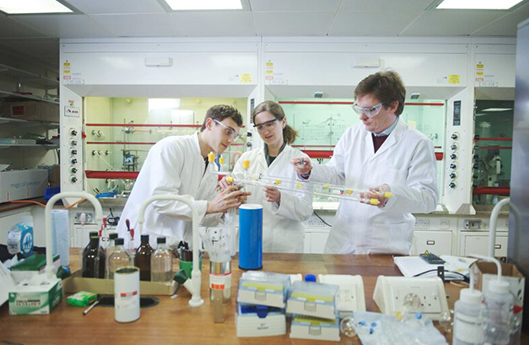Innovation management
The Group’s research and development (R&D) expenses increased from EUR 40 mn in 2018 to EUR 49 mn in 2019. Out of total R&D expenses in 2019, EUR 8.945 mn (or 18%) was attributable to low-carbon solutions, such as hydrogen, advanced fuels, Co-Processing, and other Downstream innovations.
In fulfilling our purpose of providing “The energy for a better life,” OMV actively explores new solutions and technologies for delivering affordable and carbon-efficient products in a responsible way. At the same time, introducing innovative solutions to our business means seizing the opportunity for more efficient production and expansion to new market areas. This strengthens our economic resilience in line with developments in the energy sector.
The purpose of innovation at OMV is to make operations more efficient, to minimize environmental impacts, and to provide cost-efficient solutions to our customers and society. OMV has clustered its innovation activities in the following areas: biogenic oil Co-Processing, circular economy, and hydrogen. Beyond this, we focus on digitalization and optimized drilling, production, and reserves. Each innovation area is described below.
OMV collaborates globally with universities1e.g., University of Cambridge, Stanford University, TU Wien – Vienna University of Technology, Montanuniversität Leoben, Johannes Kepler University Linz, University of Natural Resources and Life Sciences (BOKU) Vienna, Sofia University, University of Mining and Geology Bulgaria, research institutes2 as well as with industry partners and relevant initiatives.
For example, OMV cooperates with various research institutions in the following areas:
- Hydrothermal liquefaction of biomass waste to bio-oil (with University of Leoben)
- Fast pyrolysis of biomass waste to bio-oil (European-funded research project)
- Conversion of CO2 to alcohols with microorganisms (University of Technology Vienna)
- Photo reforming of water and CO2 (University of Cambridge, Christian Doppler Institute)
- CO2 reforming (K1-MET and University of Leoben)
- Storing and utilizing sustainable electric energy via synthetic e-fuels or chemical products (through a partnership within the German-funded Kopernikus project)
